Introduction to Treatment Options
Understanding the options available for addiction recovery is a critical step on the path to wellness. When it comes to choosing between residential and outpatient treatment programs, individuals and families are faced with important decisions that will influence recovery outcomes. Each treatment type offers distinct benefits and drawbacks, shaped by the severity of addiction, lifestyle responsibilities, and personal circumstances. This article delves into the advantages and limitations of each approach, offering insights to guide informed choices.
Defining Residential and Outpatient Treatment
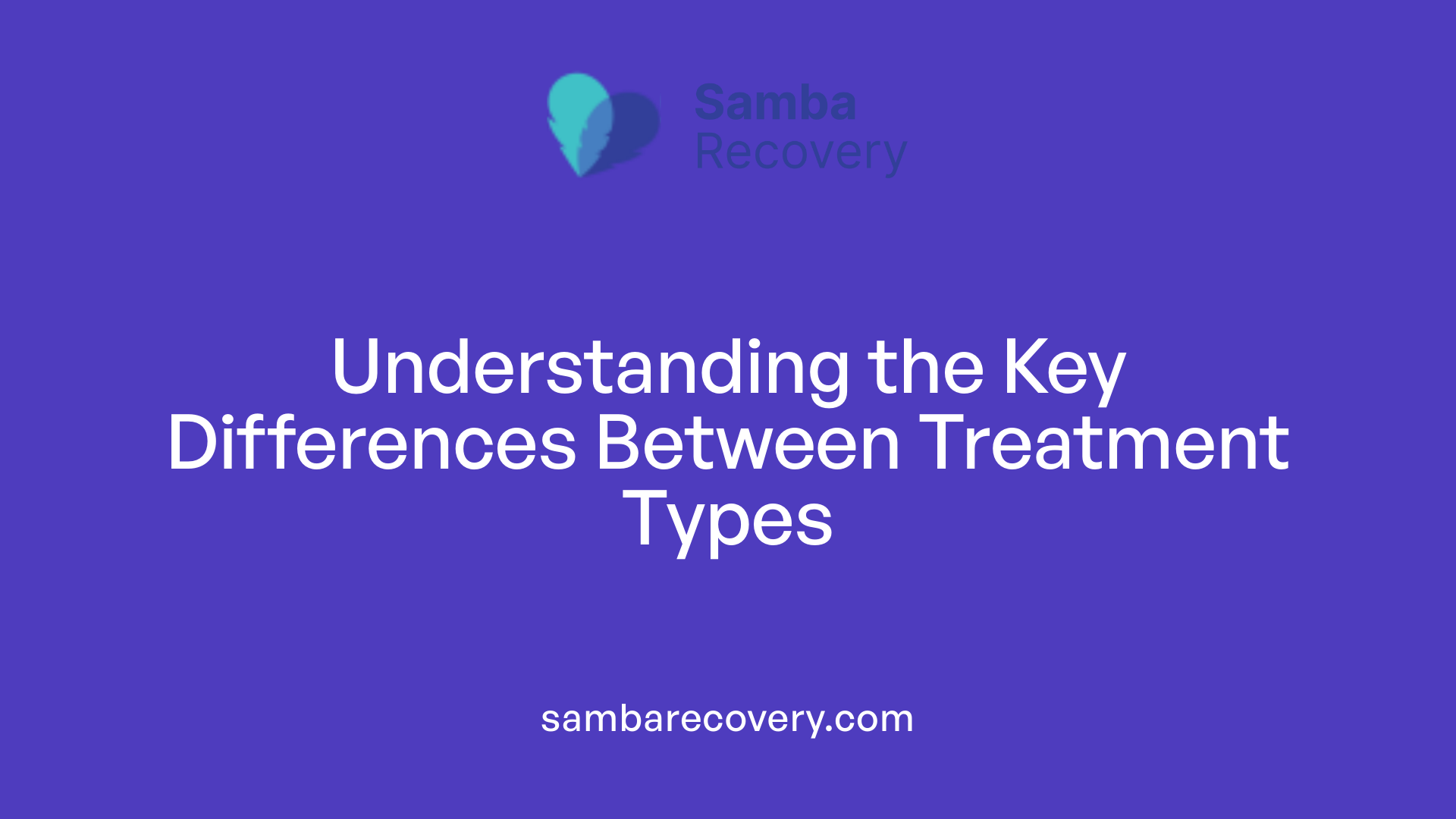
What is the difference between residential and outpatient treatment programs for addiction recovery?
The primary difference between residential and outpatient treatment programs for addiction recovery lies in the living arrangement during treatment.
Residential Treatment:
- Requires individuals to stay at a facility full-time.
- Provides 24/7 supervision and a structured environment.
- Suitable for those with severe addiction issues or co-occurring mental health conditions, as it helps to remove patients from daily triggers and distractions.
- Typical duration ranges from 30 days to six months, allowing for comprehensive care including detoxification and often family involvement.
Outpatient Treatment:
- Allows individuals to reside at home while receiving care.
- Offers flexibility to manage daily responsibilities such as work or school.
- Usually less expensive, often costing under $1,000, and lasts from three to six months, varying by individual needs.
- Includes different levels of intensity, such as Intensive Outpatient Programs (IOP) and Partial Hospitalization Programs (PHP), which provide structured support but still allow for home living.
The choice between these options depends on personal circumstances, particularly the severity of addiction and the level of support needed during recovery.
Understanding Outpatient Care
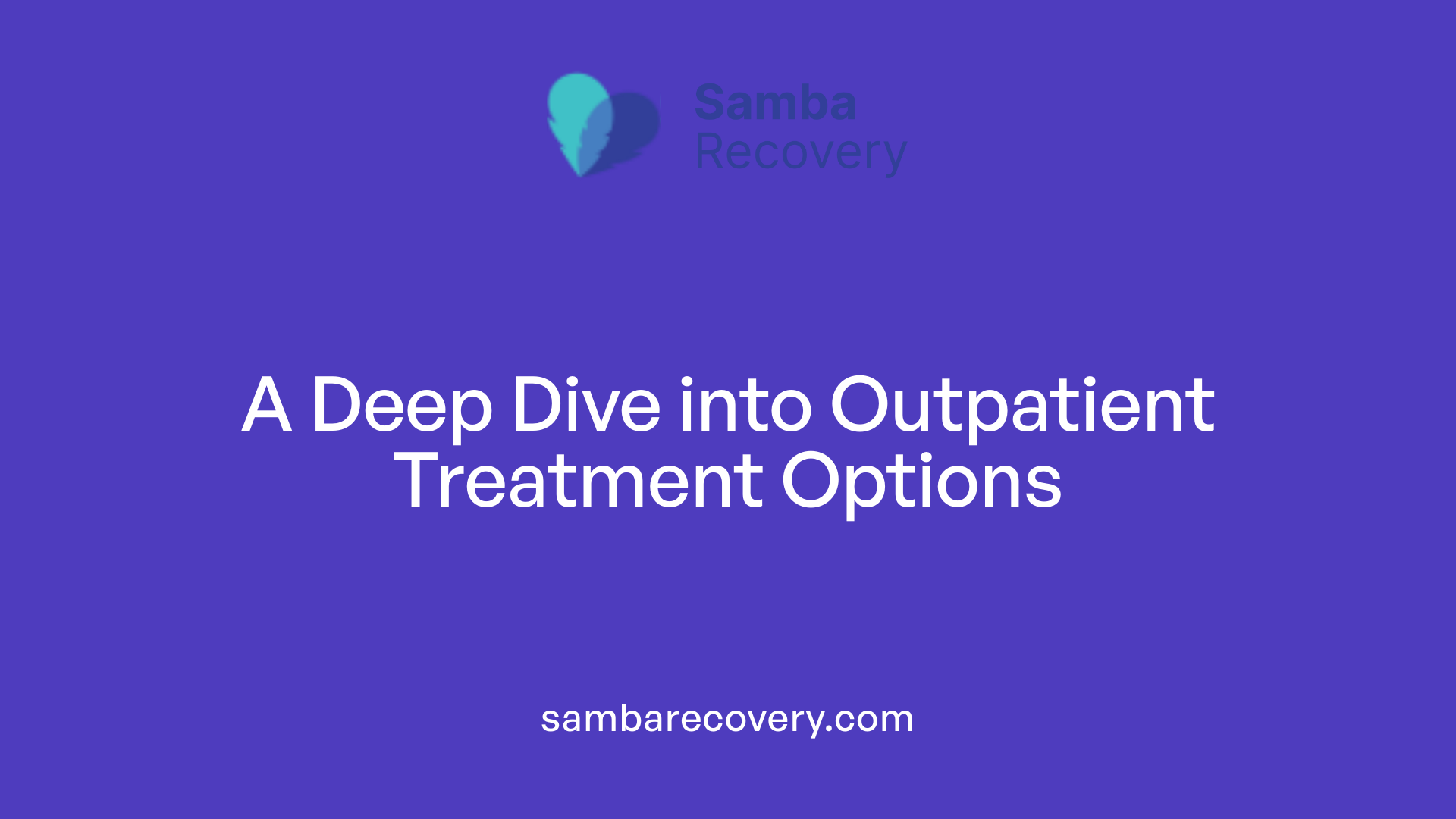
What is outpatient treatment?
Outpatient treatment is a flexible care option for individuals facing substance use disorders or mental health issues. Unlike inpatient programs that require full-time residency, outpatient care allows people to attend therapy sessions while continuing their daily responsibilities, such as work or school. This approach makes outpatient treatment generally less restrictive and more accessible.
Typically, outpatient programs are divided into levels of care that cater to varying needs. Two common types include Partial Hospitalization Programs (PHP) and Intensive Outpatient Programs (IOP).
- Partial Hospitalization Programs (PHP): Involve around 5-6 hours of structured treatment each day, providing intensive support while allowing clients to return home at night.
- Intensive Outpatient Programs (IOP): Usually consist of about 3 hours of programming several times a week, offering therapeutic services while maintaining flexibility for the clients.
Levels and flexibility of care
Outpatient treatment programs offer significant flexibility, which can be essential for individuals who have responsibilities that prevent them from committing to inpatient care. These programs often incorporate social support networks, including recovery groups like Alcoholics Anonymous (AA), to enhance sobriety and accountability.
The cost of outpatient treatment is generally lower than that of inpatient care, making it an attractive option for many individuals. By allowing clients to engage with their treatment while maintaining a semblance of normalcy in their lives, outpatient programs can promote a balanced recovery experience.
Exploring Outpatient Programs
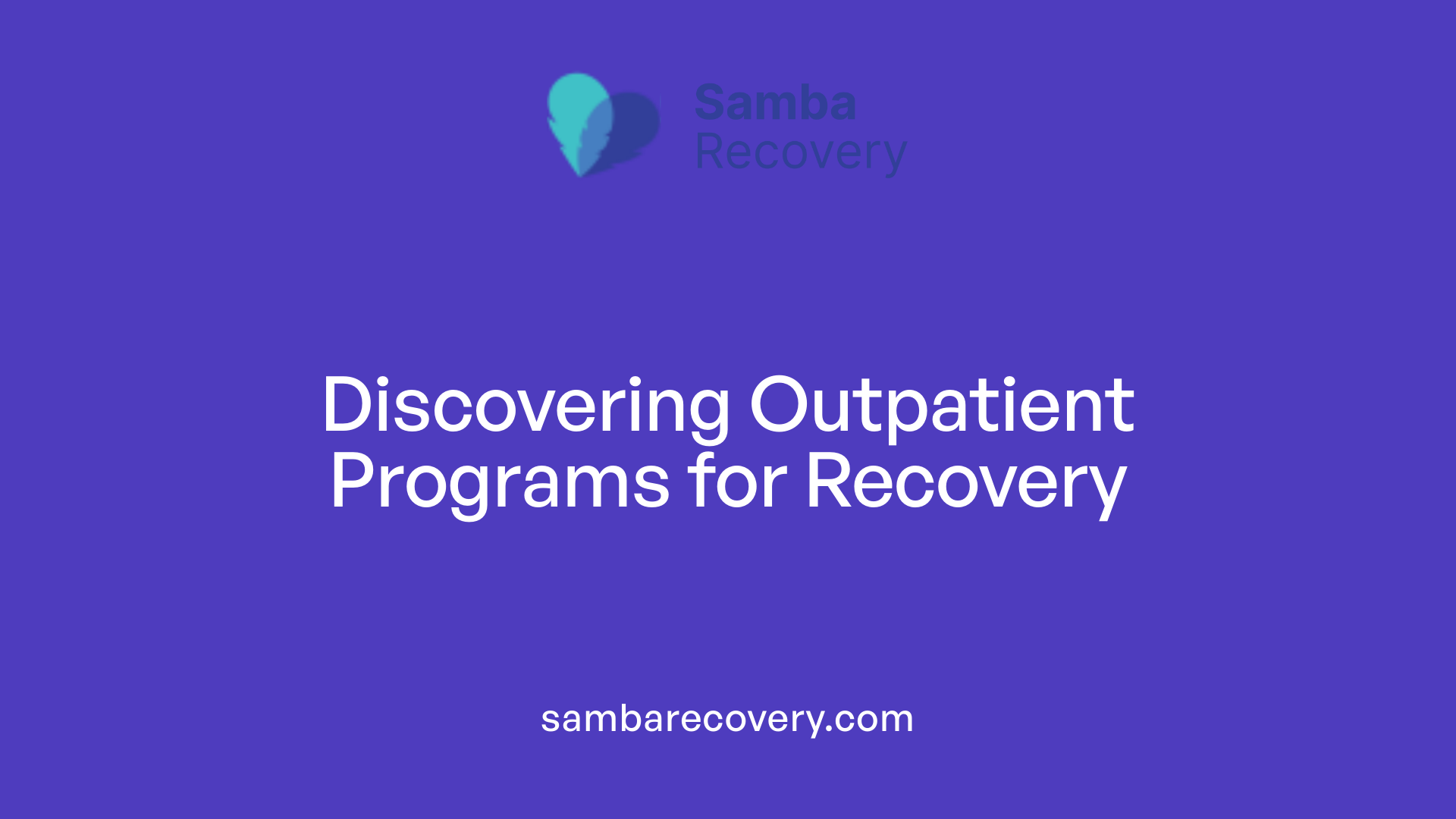
What are outpatient programs?
Outpatient programs provide treatment for addiction and mental health issues without individuals needing to stay overnight in a facility. These programs enable patients to live at home while receiving care, allowing them to maintain their daily activities such as work or school.
Types of outpatient programs
Outpatient treatment options vary in intensity and include:
- Partial Hospitalization Programs (PHP): This level offers a high degree of care, often involving around 30 hours of programming weekly, including detox and therapy sessions.
- Intensive Outpatient Programs (IOP): Clients attend several hours of treatment per week, typically around 9 hours, and engage in individual therapy, group sessions, and education about addiction.
- Outpatient Continuing Care: This is a less intensive option that may follow more intensive programs, focusing on skills for ongoing recovery and relapse prevention.
Who might benefit from outpatient programs?
Outpatient programs are best suited for individuals who have:
- Mild to moderate addiction issues.
- A stable home environment and support network.
- The ability to manage responsibilities at work or school while attending treatment sessions.
In summary, outpatient treatment is an excellent choice for those seeking a flexible recovery framework that integrates well with their daily lives.
Comparing Effectiveness and Safety
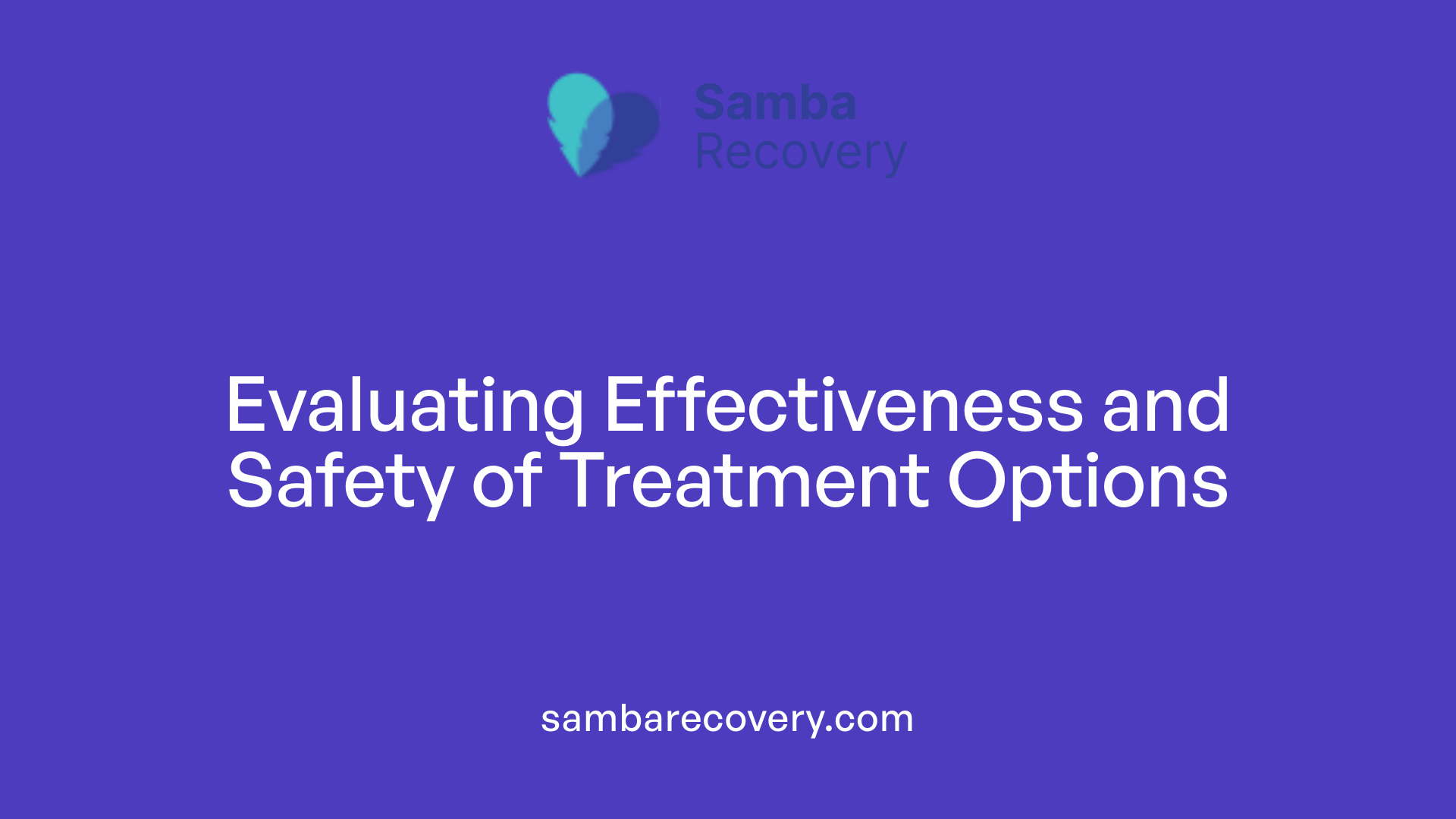
How do the effectiveness and safety of residential and outpatient treatment options compare?
The comparison of effectiveness and safety between residential (inpatient) and outpatient treatment options greatly depends on individual needs and circumstances. Various studies show that outpatient care can often demonstrate superior detoxification completion rates and, in some instances, higher rates of abstinence compared to inpatient settings. This is particularly true for outpatient programs that allow individuals to engage with their daily lives while receiving treatment, fostering a practical application of skills learned during therapy.
In contrast, inpatient programs provide a highly structured environment with 24/7 supervision, which can significantly benefit individuals with severe addictions. Research indicates that patients in inpatient care generally consume less alcohol in the year following treatment. Although these programs may lead to higher abstinence rates shortly after treatment, these benefits can decline over time, indicating the importance of ongoing support and follow-up.
Overall, patients who complete either treatment type are typically able to maintain sobriety and function well in daily life. Factors such as addiction severity, presence of co-occurring disorders, and available support systems play critical roles in determining the best fit for an individual’s treatment journey. The optimal choice should encompass both the effectiveness and safety features tailored to the patient’s specific situation and recovery needs.
An In-Depth Look at Inpatient Treatment
What is inpatient treatment for substance abuse?
Inpatient treatment for substance abuse, also known as residential treatment, is a comprehensive program where patients live at a facility full-time to receive intensive care for serious substance use disorders. This type of treatment provides 24-hour medical and emotional support, which is critical during detoxification and withdrawal management.
Key Features of Inpatient Treatment:
- Duration: Typically lasts from 30 days to 6 months.
- Environment: A secure, controlled setting free from external triggers, allowing patients to focus solely on recovery.
- Support: Comprehensive medical care, counseling, and therapy are provided around-the-clock by trained professionals.
- Activities: Patients participate in a structured daily schedule that includes individual and group therapy sessions, holistic therapies, and educational workshops, promoting a well-rounded recovery process.
- Family Involvement: Many programs include family counseling sessions, emphasizing the importance of a support system for successful recovery.
Key components and patient experience
Patients in inpatient treatment benefit from a comprehensive approach to healing that addresses both addiction and underlying mental health issues. The patient experience is filled with supportive interaction and structured activities designed to challenge behaviors associated with substance use.
Components of Inpatient Treatment:
| Component | Description | Benefits |
|---|---|---|
| Medical Detox | Safe withdrawal management under medical supervision | Reduces discomfort and craving levels |
| Therapeutic Activities | Group counseling, individual sessions, and holistic practices | Builds coping skills and community support |
| Family Counseling | Involves family members in the recovery process | Strengthens support network |
| Continuous Monitoring | 24-hour medical care and supervision | Ensures safety and immediate support |
| Structured Environment | Routine schedules help eliminate distractions and foster focus on recovery | Increases treatment engagement |
Inpatient treatment is invaluable for those needing intensive support, particularly for individuals facing severe addiction challenges or co-occurring disorders.
Daily Life and Structure in Treatment Programs
How do residential and outpatient rehab programs compare regarding daily life and structure?
Residential rehab programs provide a highly structured environment with a daily regimen designed to foster recovery. This typically includes:
- Therapy Sessions: Individual and group sessions that promote healing and peer support.
- Scheduled Activities: These may involve experiential therapy, academics, and recreational activities to encourage personal growth.
- Meal and Rest Schedules: Consistency in daily routines helps instill healthy habits and ensure that emotional and physical needs are met.
Participants live on-site, which minimizes distractions and allows for full immersion in the recovery process. With 24/7 medical and emotional support, residential programs focus completely on the individual’s healing journey.
In contrast, outpatient programs offer more flexibility, enabling individuals to attend scheduled therapy sessions while managing their everyday responsibilities, such as work or family commitments. Outpatient structures may include:
- Partial Hospitalization Programs (PHP): Intensive treatment schedules that require several hours per week.
- Intensive Outpatient Programs (IOP): This may involve around 9 hours of therapy weekly, including both group and individual counseling.
- Flexible Scheduling: This allows participants to apply coping strategies in real-life situations, although it can expose them to potential triggers.
Ultimately, the choice between residential and outpatient programs depends on the individual’s specific needs, the level of support required, and personal circumstances.
Advantages of Outpatient Care
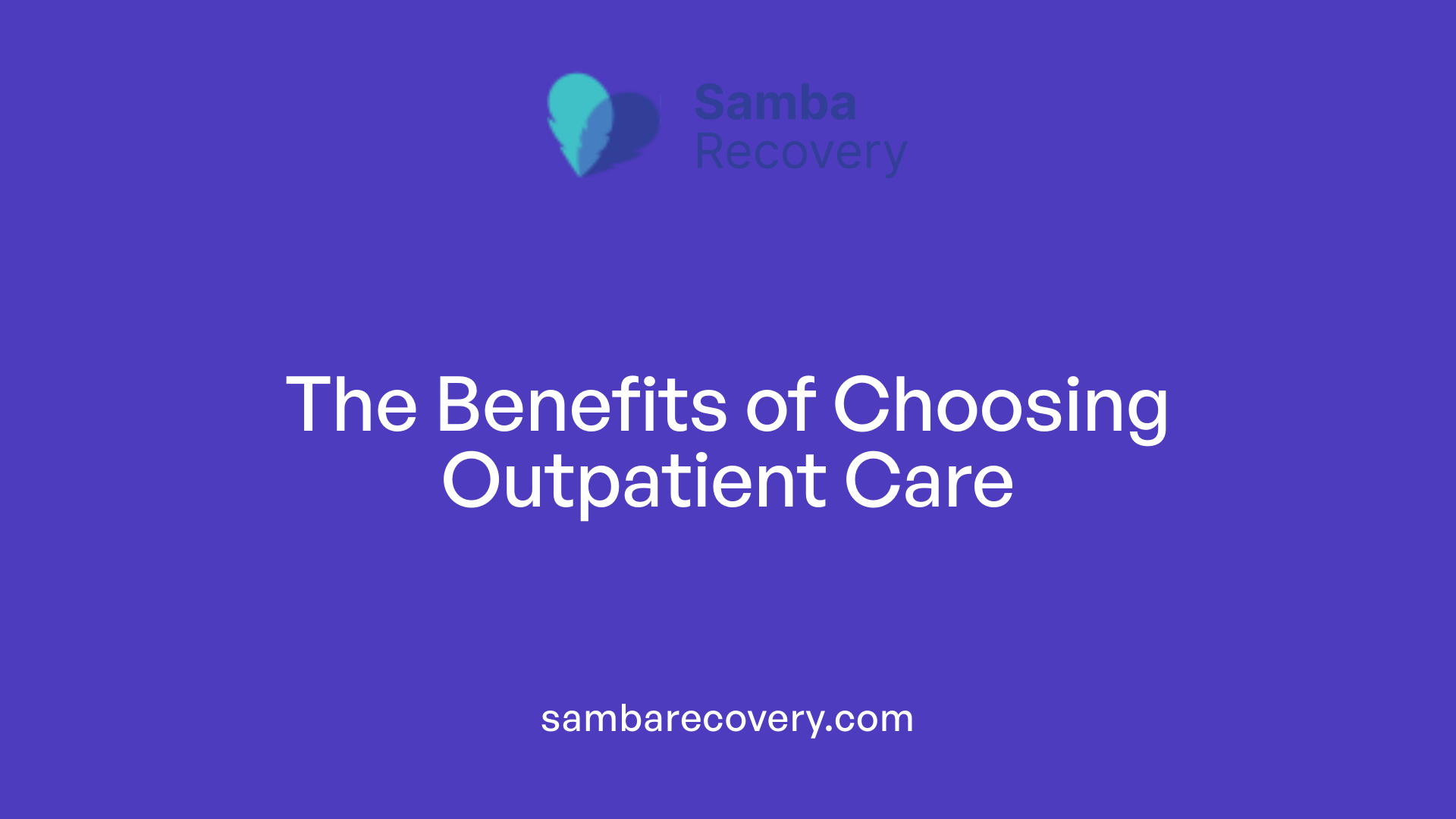
What are the advantages of outpatient care facilities?
Outpatient care facilities offer several distinct advantages that make them an appealing choice for many individuals undergoing treatment. One of the most significant benefits is cost savings—by eliminating overnight hospital stays, outpatient care can cost significantly less, often under $1,000 compared to inpatient programs that can reach $40,000 per month.
Flexibility is another key advantage. Patients can schedule appointments that fit around their daily lives, allowing them to continue working or attending school while managing their treatment. This convenience enhances accessibility, enabling a smoother integration of healthcare into everyday routines.
Moreover, recovering in a familiar environment can lead to faster recovery times. Patients often feel more comfortable and supported at home, which can facilitate healing.
Advancements in technology, such as telehealth, have further improved outpatient care, providing patients easier access to medical consultations and therapeutic services from the comfort of their homes.
Who benefits most from outpatient care?
Outpatient treatment is particularly beneficial for individuals with mild to moderate substance use issues. Patients who have stable home environments and robust support systems are often well-suited for outpatient care. It allows them to maintain their routines while focusing on recovery.
Additionally, those transitioning from residential care often utilize outpatient programs to reinforce their recovery without the intensive structure of inpatient settings. The combination of outpatient therapy with family support and community resources enhances their chances of long-term sobriety, making it an effective follow-up after more intensive treatment.
Overall, outpatient programs provide a balance of support and flexibility, catering to the diverse needs of patients seeking recovery.
Choosing the Right Program for You or a Loved One
How can one determine the most suitable treatment program for themselves or a loved one?
Determining the most appropriate treatment program requires careful consideration of individual circumstances and needs. It’s essential to grasp the differences between inpatient and outpatient care. Inpatient programs offer a structured environment with 24/7 support, making them ideal for severe addictions requiring constant supervision. In contrast, outpatient programs provide flexibility, allowing individuals to maintain daily routines while attending scheduled therapy sessions, making them suitable for those with milder addictions.
A comprehensive assessment using the ASAM Criteria can help clarify these needs. This evaluation considers mental health conditions, support systems, and the severity of addiction. Engaging in candid discussions about treatment can illuminate barriers and feasible options.
Professional guidance in treatment selection
Additionally, seeking professional guidance is an invaluable step in this process. Addiction professionals can assist in identifying the most effective programs based on the unique characteristics of the person seeking help. Their expertise can provide insights into local treatment options, costs, and potential outcomes of various programs.
Researching programs in advance can also facilitate discussions, allowing families to present alternatives that feel less intimidating. In some cases, organizing an intervention might be necessary, especially if the individual shows resistance towards seeking help.
Ultimately, a collaborative approach between families and addiction experts is pivotal, ensuring that the treatment plan is personalized and addresses the specific challenges being faced. This thoughtful selection process significantly increases the likelihood of successful recovery.
Cost and Accessibility Considerations
Financial Implications of Treatment Choices
The cost of addiction treatment varies significantly between inpatient and outpatient programs. Inpatient treatment can range from $2,000 to $40,000 per month, reflecting the 24-hour medical and therapeutic support provided in a controlled environment. Meanwhile, outpatient programs generally offer a more affordable alternative, often costing under $1,000. This lower price point can make outpatient care more accessible to those with financial constraints, allowing them to maintain their daily responsibilities.
Availability and Its Impact on Treatment Decisions
The availability of treatment options can also heavily influence an individual’s choice between residential and outpatient care. Residential treatment programs are often limited in number due to a shortage of facilities, which means that not everyone has access to these resources when needed. Conversely, outpatient programs tend to be more widespread, giving individuals easier access to flexible treatment schedules. In summary, while inpatient care provides intensive support, the higher costs and limited options often push patients to consider outpatient alternatives that align better with their needs.
Conclusion
Both residential and outpatient treatment programs offer viable paths to addiction recovery, each with unique benefits and limitations. Understanding the differences between them, including the level of care, flexibility, and costs involved, will help individuals make an informed choice that aligns with their specific needs and circumstances. By educating themselves on these treatments, individuals and families can better navigate the complex landscape of addiction recovery and move confidently toward long-term wellness and recovery.
References
- Inpatient Vs. Outpatient Rehab – Addiction Center
- Outpatient vs. Inpatient vs. Residential Treatment – Newport Academy
- Residential Versus Outpatient Treatment in the US
- Summary of Evidence – Inpatient and Outpatient Treatment … – NCBI
- Inpatient vs. Outpatient Rehab: What’s Right For You? – Healthline
- How Do Residential and Outpatient Rehab Programs Compare?
- What Is the Difference Between Outpatient and Residential Treatment?
- Pros and Cons of Residential Treatment Vs. Outpatient Care
- Residential Vs Outpatient Treatment – Serenity Grove






